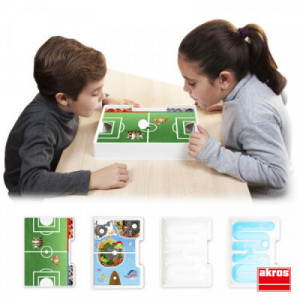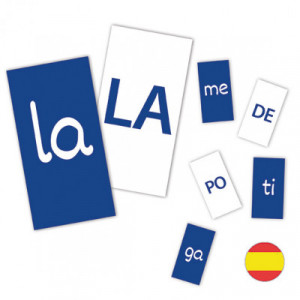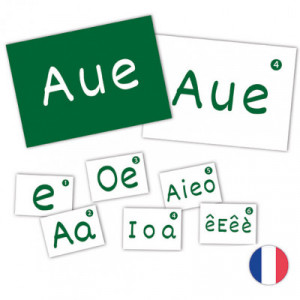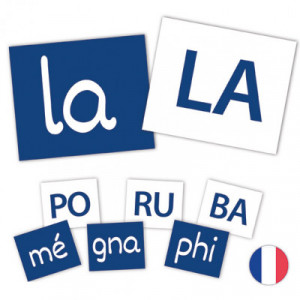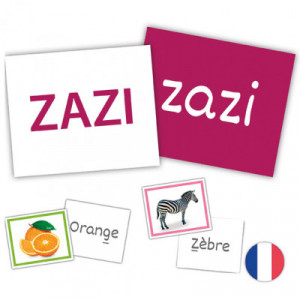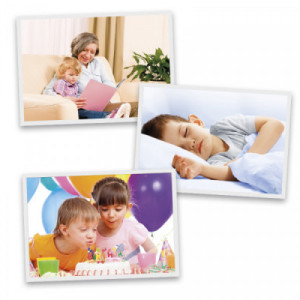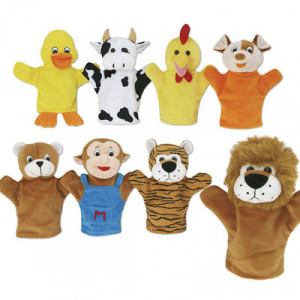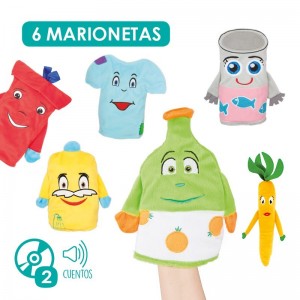Improving speech and pronunciation
Sometimes speech and pronunciation is not fluent. Some children have difficulty articulating or producing their speech clearly and fluently. In these cases, early detection, daily consistency, and following the correct guidelines with the appropriate material are very important.
In this sense, we propose different materials and games for the work and development of activities such as strengthening the orofacial musculature, which are also fun and attractive for children. In this section we include products of the Logo-Bits Method, board games, puppets and games that stimulate speech and verbal fluency.
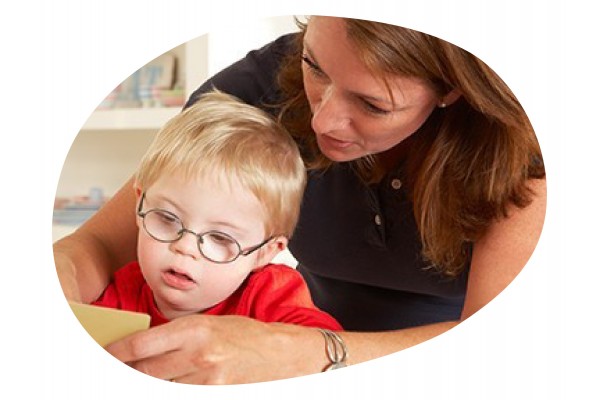
Lecto-bits cards with phonetic syllables for learning to read and improving reading skills
Logo-bits cards with all the consonant clusters for improving pronunciation according...
Lecto-bits de syllabes simples pour soutenir la parole et améliorer la lecture
Logo-bits de capacité articulatoire pour corriger la prononciation selon le point...
It is essential to stimulate the child through play. Therapy or learning will gain a playful component that motivates the child. Family games will also serve as the best continuation of treatment at home and reinforce what you have learned.
The different degrees of difficulty in language acquisition affect different linguistic functions, such as phonological, semantic and morphosyntactic. Early detection will determine whether it is a simple delay, which only affects pronunciation or voice, or other pathologies.
The younger the age of detection, the more successful the treatment can be as a result of the brain plasticity of young children. Plasticity implies that the brain can develop compensatory mechanisms for certain deficiencies.
How to Choose Games for Language Disorder
Once the diagnosis is established, the child requires an individualized plan. Depending on the characteristics of the young person, exercises and activities are incorporated into the therapy to develop the affected language functions.
- Phonological level. We work on the discrimination of sounds and pronunciation: the different lengths, intensities, tones or other sound qualities. The games to train this ability are based on identifying and pronouncing written phonemes or onomatopoeias, or games of associating syllables with their corresponding sounds.
- Exercises to improve the oral health system. Language delay may be due to difficulties in the fine motor skills of the muscles involved. The child can learn to pronounce through many activities such as blast games, and by blowing up balloons, for example.
- Exercises to improve morphosyntax. Games where the child can talk and participate with the narration of a story; Akros' stories include audio CDs with stories in a more interactive way, as the child listens to the voice of the narrator and associates it with the text. Such as games and exercises that consist of establishing chronologies or completing sentences with missing words.
Akros offers a line of games in which the child must differentiate and gather elements of the same semantic family. With similar mechanics, there are grammar association games and a range of definition games to learn new words that will increase your child's vocabulary.
Role-play games and activities, with costumes or puppets, encourage children with pronunciation problems to play roles and express themselves as such. You can also get used to having to speak in public.
How to help improve speech at home
The usual advice from specialists for parents emphasizes the importance of communicating a lot (and playing a lot) with their children, whether or not they have language problems, as a fundamental part of their maturation.
Constant communication and loving requests for the child to tell how his or her day went or how he or she feels will strengthen his or her confidence. They should not be a power struggle, or the child may be afraid to speak up.
Sometimes, it will be the child himself who loses the fear of talking to his or her loved ones, and asks in his or her own words the name of things. You may also be taught words during your daily chores as a reinforcement to therapy and to increase your vocabulary.
Common Language Disorders: Stuttering
To correctly understand how we can treat and overcome stuttering, we must begin by knowing what this disorder really is.
Stuttering can be defined as a speech disorder characterized by the constant interruption of the flow, with repetitions or prolongation of syllables, etc., caused by the inability of the sufferer to articulate a word.
Sometimes such interruptions in the flow of words can also be accompanied by certain visible signs on the face, such as winks and grimaces.
Causes that can cause stuttering
Speaking in public, or rather, the fear of speaking in public, can cause stuttering, even on the phone if the situation is tense.
The mechanisms that make speech flow naturally are as follows:
- Respiratory mechanism: breathing as we speak.
- Expression mechanism: the phonation, or the work that the muscles do to be able to emit sounds that are understood.
- Joint: includes the throat, lips, teeth, palate, and tongue.
All of these mechanisms are coordinated and controlled by the brain, but are also monitored by both the ear and the touch.
When these mechanisms do not work properly, speech does not flow naturally.
Stuttering was once thought to be a psychological disorder that originated in people's minds, but it is now known that there are very few cases of stuttering and that it is caused by some form of mental illness.
As we have already mentioned, the origins that cause stuttering are not yet determined, some possibilities are suspected but none are conclusive.
Those who say that stuttering can often have genetic causes say it is only a suspicion.
The most normal form of stuttering is usually due to speech development in children. When they are learning to communicate through words, and with a very mild type of stuttering, which could be defined as a lack of fluency in language due to not finding the right word, or wanting to say a whole sentence and getting \stuck\" in the attempt.
On the other hand, there are also cases of stuttering that have a neuro-genetic origin, in which the brain is unable to control and coordinate in the correct way the mechanisms that make speech flow naturally, due to some kind of problem.
treatments for stuttering
There are different treatments for stuttering, which can soften it, but it is the therapy that can achieve the best results, preventing this disorder, which can be temporary, from becoming a problem.
In the case of children, we should try to identify when this stuttering occurs, whether it always or only happens on certain occasions, whether it happens when someone is present, etc.
The age of the child should also be taken into account, since up to the age of five the child may have a tendency to repeat the words or become stuck, etc., but it is from this age that he or she should be fluent in the language that if it is not given, he or she should try to correct it.
5 tips for stuttering
Some exercises such as speaking alone or singing often improve this disorder, but we must be clear on the following points to help children with this type of disorder:
- Don't finish the sentences: this doesn't help, we must try to be patient and allow the children to finish what they are trying to say. It's the best way to get them to face the problem.
- Do not humiliate: belittling, insulting or getting angry because they do not have the desired fluidity can only aggravate the case.
- Blow Exercises: There are some games that can help, in which participants must blow to achieve the objective of the game. However, it is also possible to blow up a balloon, blow out a sail, etc.
- Speak in turns-when the adult starts a sentence and the child has to finish it
- Singing with the child: if you record it, you will be able to see how he or she does not stutter while singing, and we can explain that this is due to the fact that when singing he or she is correctly managing the air that must be expelled.
Locked syllables: definition and exercises
There are different types of syllables depending on the set of letters that form them. Thus, we have inverse syllables, direct syllables, mixed syllables and finally, the blocked syllables. Locked syllables or symphons are terms used in the world of speech therapy to refer to those syllables in which two consecutive consonants and one vowel appear. As a general rule, these syllables are often difficult to pronounce and are the most difficult to acquire in language development and literacy.
They are called locked because children's tongues often get stuck when they try to pronounce them, hence the mistake. The existing combinations of locked syllables are:
Bl, br, cl, cr, dr, fl, fr, gl, gr, pr, pl and tr.
Common pronunciation difficulties
Difficulties in the pronunciation of words or dyslalias are very common and present difficulties of this type, as they are the most complex and are the last to be pronounced correctly.
Symphons with \"l\" are generally less difficult than those containing \"r\". That is why, when it comes to starting to intervene, it would be done for those containing the'l'. In addition, we must ensure that children have no difficulty pronouncing the syllables separately, i.e. if we want to start working on the \"bli\" symphony, we must first observe whether the pronunciation of \"b\" and \"l\" separately is correct.
Activities for working with locked syllables
Reading, writing, and modeling activities are useful for working through difficulties with blocked syllables.
For example, you can choose a block of syllables and introduce them to the child. First, let the adult read them correctly and encourage them to repeat what they have heard. It is important that we do this very slowly, so that the child can copy well all the movements of the mouth and other phonatory organs.
To help make pronunciation easier, at the beginning we can introduce the vowel that accompanies the symphony between the two consonants, for example, in mist pronounce buruma. We must put the accent on the second vowel, that is, we will pronounce burúma, encourage the child to pronounce the word in this way repeatedly and eventually end up pronouncing it correctly without realizing it.
The reading and writing cards that work on the locks present the isolated syllables together with the words and images to which they refer, being able to work with them through different types of processing and allowing them to become familiar with them.
With pre-reading cards that give feedback to the child, both the reading and the writing of the locked syllables can be worked on. These cards allow the child to self-correct and be aware of the error in order to learn the correct way by himself.
Games to practice locked syllables
There are some language games that can help children and toddlers to learn the locked syllables. In any kind of learning, play is essential for children to feel that they have been brought to learn and to become better acquainted. It will also help to reduce the stress that can be created by reading or pronouncing wrong words and will help you to acquire them.
The nursery rhymes that work the syllables and encourage repetition will offer the child a correct model of learning. As in the previous activity we can give you approximation strategies so that you progressively approach the correct form of pronunciation.
Word games. For example, the rain of words, in which we will form two teams and will have to take turns saying words that contain the selected locked syllable. It can also be done in a cooperative format, in which a number of words to be reached are put together and they all have to achieve it.
Sound lots. We can use lotus word games and instead of having to associate images with words, as you take a picture the one who says the word you refer to first gets the picture.
Lotuses. In addition, the lotus is a game with which we can work on many aspects of language. It allows you to expand your vocabulary, reading and writing.
Syllable puzzles. With the syllable puzzles we can also work on the locked syllables. On the one hand, you will learn to recognize the syllable and know which words contain it and finally, we can encourage you to read the word formed, so that we can practice reading and/or diction. Here it is interesting that we give you the model if we think you are going to have difficulties.
The phonetic syllable read-bits are very useful for working on the pronunciation of syllables. This type of game consists of cards with the syllables printed on them and allows you to work on reading, writing and diction.
The logo-bits method has a specific format for locked syllables. This game works the syllables offering the spelling of the syllable, the spelling of a word that contains it and the image of the object to which it refers, so that the information is processed through several channels at the same time, facilitating its learning.
"




